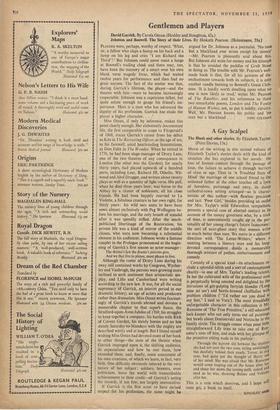Gentlemen and Players
David Garrick. By Carola Oman. (Hodder and Stoughton, 42s.) Johnson and Boswell. The Story of their Lives. By Hesketh Pearson. (Heinemann, 21a.) PLAYERS were, perhaps, worthy of respect. 'What, sir, a fellow who claps a hump on his back and a lump on his leg and cries "I am Richard they Third"!' But Johnson could never resist a lunge at Boswell's trailing cloak and there may, too, have been the memory of a smart over his own blank verse tragedy Irene, which had waited twelve years for performance and then had no great success. The fact of the matter was that, during Garrick's lifetime, the player—and the theatre with him—were to become increasingly respectable. Johnson was a capricious talker, but quite astute enough to gauge his friend's im- portance. 'Here is a man who has advanced the dignity of his profession. Garrick has made the player a higher character. . .
Miss Oman, if only by inference, makes this point clearly enough. Her elaborately documented life, the first comparable in scope to Fitzgerald's of 1868, traces Garrick's career from his debut as Kite in The Recruiting Officer, at the age of ten, to his farewell, amid heartrending lamentations, as Don Felix in The Wonder. When he retired in 1776, he had been stage-manager of Drury Lane, one of the two theatres of any consequence in London (the other was the Garden), for nearly thirty years, had played upwards of a hundred parts, including Lear, Richard III, Othello, Wit- woud and Abel Drugger, and written about twenty plays as well as a quantity of light verse. His pall, when he died three years later, was borne to the Abbey by a cluster of noblemen, all his close friends. He had been happily married to La Violette, a fabulous creature in her own right, for thirty years : his wild oats seem to have been sown almost exclusively with Peg Woffington be- fore his marriage, and the only breath of scandal after it was speedily stifled. After the much- publicised libertinage of the Restoration, his private life was a kind of mirror of the middle classes, who were now becoming a substantial element in his audiences. Johnson wrote a famous couplet in the Prologue pronounced at the begin- ning of Garrick's first season as actor-manager : The drama's law the drama's patrons give, And we that live to please, must please to live.
Although the roster of Drury Lane during his sway still contained works by Congreve, Wycher- ley and Vanbrugh, the patrons were growing more inclined to arch sentiment than aristocratic sex- play, and Lillo and Cumberland were writing according to the new law. It was, for all the social supremacy of Garrick, an interim period in our dramatic history; an age of actors and producers rather than dramatists. Miss Oman writes fascinat- ingly of Garrick's travels abroad and devotes a memorable chapter to that superb fiasco, the Stratford-upon-Avon Jubilee of 1769; his struggles to keep together a company, his battles with Rich of Covent Garden, his stately homes and no less stately Saturday-to-Mondays with the mighty are described wittily and at length. But I found myself wishing Miss Oman had devoted more of her book to other things—the state of the theatre when Garrick impinged upon it, the shifting audience, its expectations and how he met them, how exceeded them, and, finally, some assessment of his own creations, of which we learn, in fact, very little. One difficulty obviously inhered in the very nature of her subject : soldiers, brewers, even politicians, leave the world with transcribable achievements to their. credit—of Garrick's acting the records, if not few, are largely unevocative. If Garrick is the first actor to have earned respect for his profession, the same might be argued for Dr. Johnson as a journalist. 'No mat! but a blockhead ever wrote except for money —Mr. Pearson is pleasantly acid about this. But Johnson did write for money and his triumph is that he avoided the puddles of „Grub Street in doing so. The trouble with Mr. Pearson's well- made book is that, for all his gestures of dis- enchantment towards both its subjects, it is only another candle burning to Boswell's Great Club- man. 'It is hardly worth dwelling upon what no one is now likely to read,' writes Mr. Pearson of The Rambler, and his references to those two remarkable poems, London and The Vanity of Human Wishes, are, to put it mildly, cursory. Well,' Mr. Pearson knows his public and 'no man but a blockhead . . JOHN COLEMAN














































































 Previous page
Previous page